#a thousand ships by natalie haynes
Text
One of the review blurbs for Natalie Haynes's novel "A Thousand Ships" asserts that it "more than acknowledges the suffering of women." And, yeah. After reading this, I gotta agree: Women Do Be Suffering.
I read the majority of this while flying, which may have been the best environment for it. The narrative jumps between an ensemble cast of characters, which kept things fresh and engaging while never letting up on the bleakness of war. I didn't find any of the content particularly depressing or triggering, though.
Compared to the other Greek myth retelling I read this year, this one is a clear winner. I can't argue that it's doing anything really new but it does the classics faithfully.
Various thoughts:
Calliope was the most fascinating point of view, but I think it would have been smarter to break the 4th wall and have Calliope sing to Haynes and not an unnamed poet; I get what her POV is meant to explore, but it's been done before; I would have preferred something new
The Penelope sections were a waste. I do not need Penelope to recount the entirety of the Odyssey to me. I want to know what she's been doing. The quick aside that she was tempted by one of the kinder suitors would have been fascinating to explore if it was more than 2 paragraphs long. I do not need to hear her play by play on Odysseus's misadventures.
Cassandra, Hecabe, Andromache, and Clytemnestra had the most fascinating perspectives
Also Oenone's chapter was my favorite out of all of them.
What little Odysseus appeared in the story was great, which reaffirms to me how much he's my favorite literary character
I take issue with how the book markets itself as the Never Before Heard stories of the women in the Trojan war when there is such an extensive history of plays and poems written about them; for a while, I thought that the book itself believed in its own hype but reading Haynes's note at the end made me realize that I was being an idiot misinterpreting things and Haynes actually knows what she's doing more than I do
That being said, not writing Helen's point of view is a mistake; I get WHY Haynes declined to give her a perspective, but I was enthralled by her character whenever she did appear; I also would have liked to see Haynes's perspective on the idea that Helen ran away with Paris because Aphrodite made her insane (a la the Odyssey)
Overall, 4/5. Glad I read it!
#next time i read something with the greek myth it's going to be one of the sources. i cannot keep doing these retellings#though I just remembered that YA book that adapts the odyssey despite the author gloating about how she never read it#I think i need to read that to know if there is someone who could write Odysseus incorrectly#me rambling#me reading#a thousand ships#natalie haynes#a thousand ships by natalie haynes#thank you haynes for that end note because I was getting all up in my head about your credentials and I needed to be reminded#that I am a dumbass
19 notes
·
View notes
Text
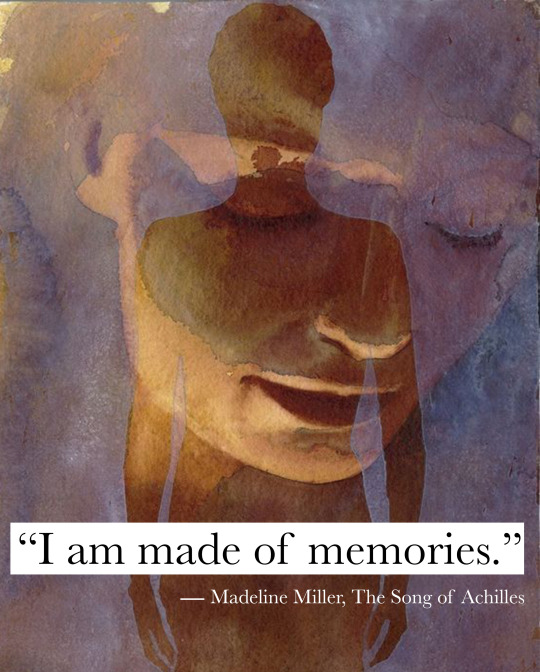
“I am made of memories.”
― Madeline Miller, The Song of Achilles
Painting: "A" by Graham Dean
#classical literature#classics#quotes#albert camus#franz kafka#poetry#sylvia plath#classical quotes#literature#booklr#madeline miller#the song of achilles#circe#natalie haynes#a thousand ships#greek tumblr#greek gods#greek aesthetic#booklover#bookblr#books & libraries#book quotes#books#reading#quote#words#quotations#lit#literary quotes#light academia
92 notes
·
View notes
Text
why do i keep reading/watching/listening to things i already know end sad
#tsoa#patrochilles#the iliad#a thousand ships#natalie haynes#hamilton#hadestown#orphydice#alexander hamilton#tick tick boom#jonathan larson#jocasta#oedipus rex#circe#ariadne#atyd#marauders#madeline miller#lin manuel miranda#wolfstar#jily#jegulus#dorlene#supernatural#destiel#help me i'm sad#i'm having the dreaded ~feelings~
227 notes
·
View notes
Text


vote yes if you have finished the entire book.
vote no if you have not finished the entire book.
(faq · submit a book)
9 notes
·
View notes
Text
Okay if you are interested in classics I cannot recommend enough the podcast Natalie Haynes stands up for the classics. It's free on Spotify and you can probably find it on YouTube too. It's so good she is so funny while also covering everything I love her sm
#classics#natalie haynes#stone blind#a thousand ships#ancient greek#ancient rome#ancient greek myths
54 notes
·
View notes
Text

Natalie Haynes, A Thousand Ships
#iphi.post#bookblr#words words words#booklr#natalie haynes#a thousand ships#the iliad#greek mythology#kassandra of troy
16 notes
·
View notes
Text
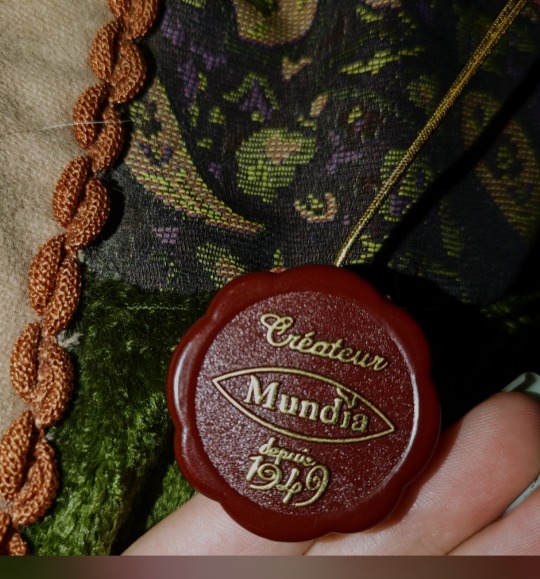

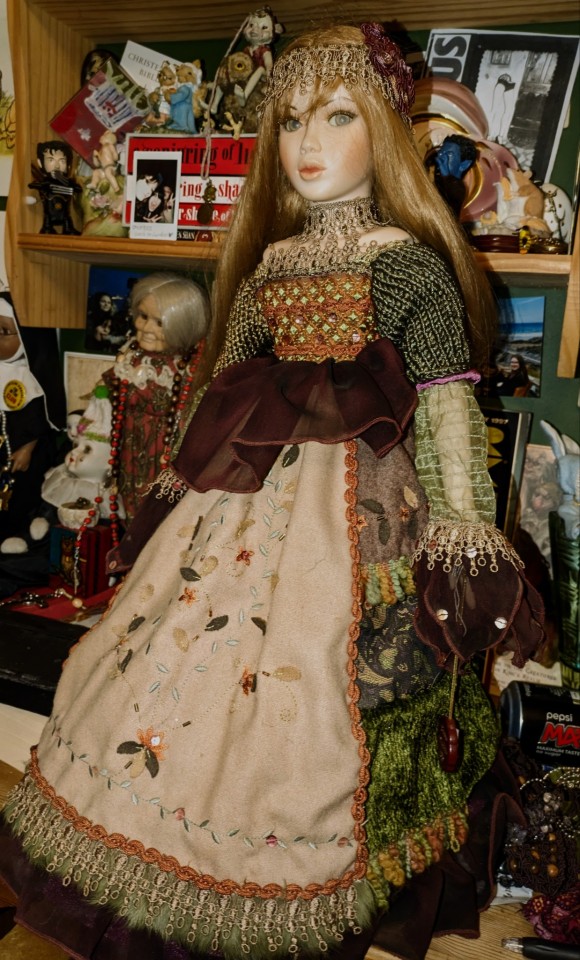
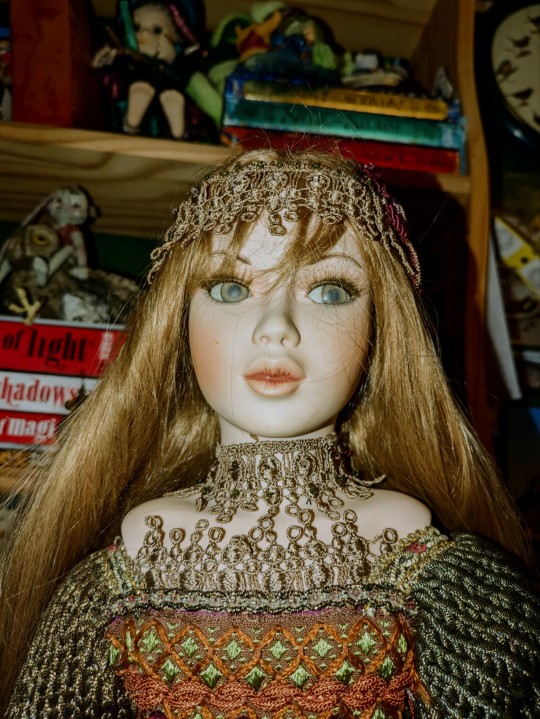
Eeek ! Got this doll the other day, she reminds me so much of gelflings and Wendy Froud dolls. She's my first doll of this brand.
Her name's Oenone for the nymph wife of Paris. She appears in Natalie Haynes 'a thousand ships' in one of my favourite quotes 'He loses his wife so he stirs up an army to bring her back to him, costing countless lives and creating countless widows, orphans and slaves. Oenone loses her husband and she raises their son. Which of those is the more heroic act?'.
#doll collector#doll#fae#doll photography#the dark crystal#jim hensen#wendy froud#natalie haynes#a thousand ships#gelfling#the iliad#whimsigoth#whimsical
26 notes
·
View notes
Text
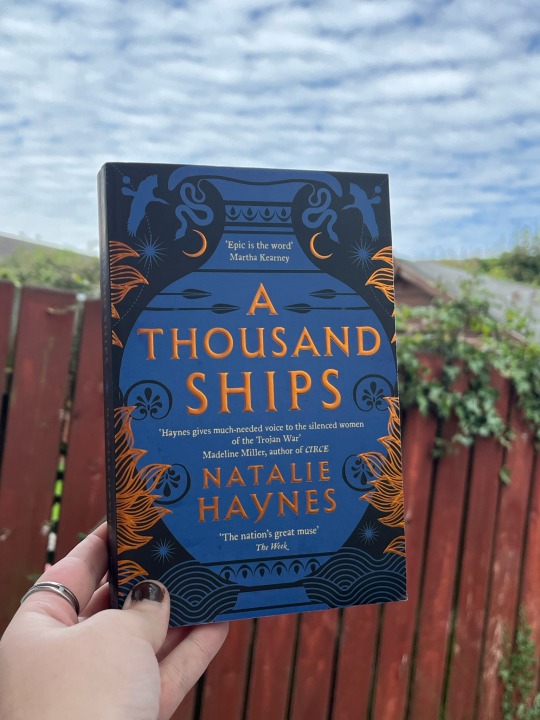
#booklover#booklr#books#booksbooksbooks#books and reading#book lover#current read#a thousand ships#natalie haynes
21 notes
·
View notes
Text
This is the women’s war, just as much as it is the men’s. They have waited long enough for their turn . . .
This was never the story of one woman, or two. It was the story of them all . . .
In the middle of the night, a woman wakes to find her beloved city engulfed in flames. Ten seemingly endless years of conflict between the Greeks and the Trojans are over. Troy has fallen.
From the Trojan women whose fates now lie in the hands of the Greeks, to the Amazon princess who fought Achilles on their behalf, to Penelope awaiting the return of Odysseus, to the three goddesses whose feud started it all, these are the stories of the women whose lives, loves, and rivalries were forever altered by this long and tragic war.
A woman’s epic, powerfully imbued with new life, A Thousand Ships puts the women, girls and goddesses at the center of the Western world’s great tale ever told.


6 notes
·
View notes
Text
i am theoretically very interested in retelling beauty and the beast 1,000 different times if i have that many ideas, but interested in retelling greek mythology 0 times
i know i landed at this point after reading a lot of uninspiring greek mythology retellings but CRUCIALLY i have ALSO read a lot of uninspiring beauty and the beasts — more, even — and honestly i just think the characters i know from homer and the tragedians (which is where the greatest part of my interest lies) are already so well-drawn that i don't know what i have to say about them through the lens and means of another story. yes, there is often something broken in the story, but i wouldn't know how to fix it without making it worse. and neither does anyone in publishing
whereas fairy tales tend to be more vague and held at a distance. in my view fairy tales are more about themes than characters (and plots, but the plots don't have to make sense). which makes them hard to flesh out into novels in a different way, but also leave way more room to demonstrate understanding without needing to be faithful
#wrote this after reading a lot of reviews for ava reid's lady m book. i hate ava reid so that was not a good faith endeavor on my part#but this also applies to shakespeare because i'm like. what do you have to say even. 'women are oppressed' cool. you have got to do better#if you're going to retell shakespeare you have to be able to offer more or at least DIFFERENT nuance than shakespeare. famously nuanced guy#and that is how i feel about homer and euripides as well#natalie haynes wrote some half-decent stories in a thousand ships but none of them were better than the trojan women.#and the only reason she knew those characters to ostensibly build on their stories IS because of ancient storytellers#so how do you approach that project with so little interest in what the ancient storytellers were doing??#thoughts
5 notes
·
View notes
Text
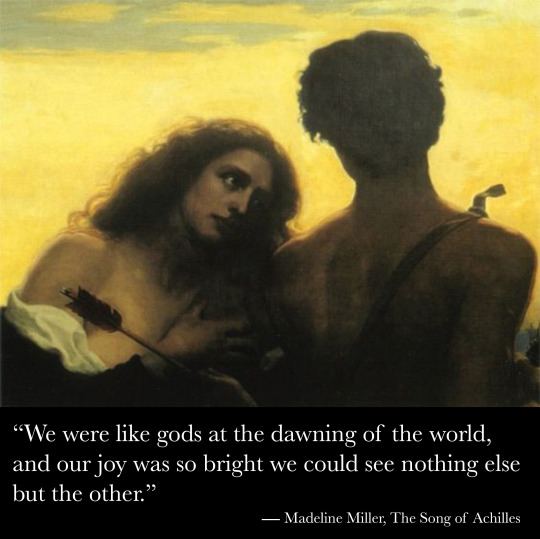
“We were like gods at the dawning of the world, & our joy was so bright we could see nothing else but the other.”
― Madeline Miller, The Song of Achilles
Painting: "Monseigneur Love" by Thomas Cooper Gotch
#classical literature#classics#quotes#albert camus#franz kafka#poetry#sylvia plath#classical quotes#literature#booklr#madeline miller#the song of achilles#circe#natalie haynes#a thousand ships#stone blind#booklover#bookblr#books#books & libraries#book quotes#reading#books and reading#bookworm#lit#literary quotes#classic literature#english literature#virginia woolf#female writers
70 notes
·
View notes
Text
But feeling fear was not the same as lacking courage. Anyone could be brave if he felt no fear.
A Thousand Ships, Natalie Haynes
16 notes
·
View notes
Text
“She isn’t a footnote, she’s a person. And she – all the Trojan women – should be memorialized as much as any other person. Their Greek counterparts too. War is not a sport, to be decided in a quick bout on a strip of contested land. It is a web which stretches out to the furthest parts of the world, drawing everyone into itself.”
— A Thousand Ships, by Natalie Haynes
19 notes
·
View notes
Text
Thoughts on Natalie Haynes? Ancient Historical Fiction and Medieval Historical Fic Lit Recs?
This isn’t a hate post but it does talk about stuff I haven’t liked in some Natalie Haynes books. Idk if she has a huge following or not, so I hope I’m not incurring the wrath of a fandom here.
I wanted to like A Thousand Ships so much. I really did. But I actually hated it. Especially Penelope’s chapters. A chance to get insight into her whole life while Odysseus was away, and all we got was letters to Odysseus that mostly recounted stuff we already knew from the Odyssey. Like, yes. It is valuable to know how her feelings toward him evolved over the time he was away. But we know she was smart and beautiful and talented. That she raised their son herself. That she managed to keep suitors at bay for nearly two full decades while still maintaining power.
Every time I would read one of her chapters I was so annoyed that we didn’t get insight into anything we didn’t know already about her. There was such a great opportunity to really explore her daily realities and inner life and instead all her chapters were just her being hopeful or bitter about a man. And given that the book is supposed to highlight the stories of the women at the periphery of these classics, it felt like such a missed opportunity. Also, her writing style meandered a little too much for me.
So, with that in mind, are her other books any better? She write about subjects I’m interested in through a lens I would supposedly enjoy, but if they’re all like A Thousand Ships I really don’t want to waste my time. Maybe it was just that particular book that wasn’t for me, though.
I have LOVED all of Pat Barker’s and Madeline Miller’s books. For Pat Barker, I really love her nuanced take on the inner lives of women in Troy/Trojan custody. It’s a truly earnest effort to describe the horrors of the time and the strength of women in a time before feminism was a defined idea. It doesn’t try to apply modern ideas of strength and fragility to the women, and it’s so fascinating and moving. She’s very good at carving out a place for women within the constraints of existing narrative.
For Madeline Miller, I really love how she touched on things we know from ancient sources and, without contradicting them, builds entirely new lore that feels like it fits right in with ancient ideas but still feels remarkably relatable to modern readers.
In terms of translations, I really enjoyed Emily Wilson’s translation of the Odyssey and Stanley Lombardo’s of the Iliad.
I’m also super into medieval (especially British) historical fiction but tend to prefer stuff that is more accurate to historical details we do actually know. I think I’d get kinda pulled out out of the narrative when reading Philippa Gregory books (even though I did enjoy the White Queen/White Princess TV miniseries).
How does Alison Weir compare?
What are people’s thoughts on Claire North? Claire Heywood? Jennifer Saint? Susanna Clarke? Any hidden gems out there for either of these eras of historical fiction/mythological fiction?
I can only check out or buy so many books at a time so I want to avoid getting like 5 on a whim and being meh on all of them.
So, y’all, who are your faves in these genres?
#bookblr#books and reading#ancient historical fiction#historical fiction#mythological fiction#book recs#lit#literature#help#a thousand ships#natalie haynes#pat barker#madeline miller#philippa gregory#alison weir#fiction#Ancient Greece#Trojan war#British history
5 notes
·
View notes
Text

Natalie Haynes, A Thousand Ships
9 notes
·
View notes
Text
What I Learned: A Thousand Ships
What I Learned from A Thousand Ships by Natalie Haynes
Women’s thoughts and roles in history and myth are way too often overlooked.
War is a hell that doesn’t just harm those who are active combatants in it.
A person can be both a victim and a perpetrator. Sometimes they’re both at once other times they take the role at different points in their life.
Heroism isn’t just determined by those…

View On WordPress
#a thousand ships#book#fantasy#iliad#literature#mythology#natalie haynes#odyssey#trojan war#What I Learned#women
10 notes
·
View notes